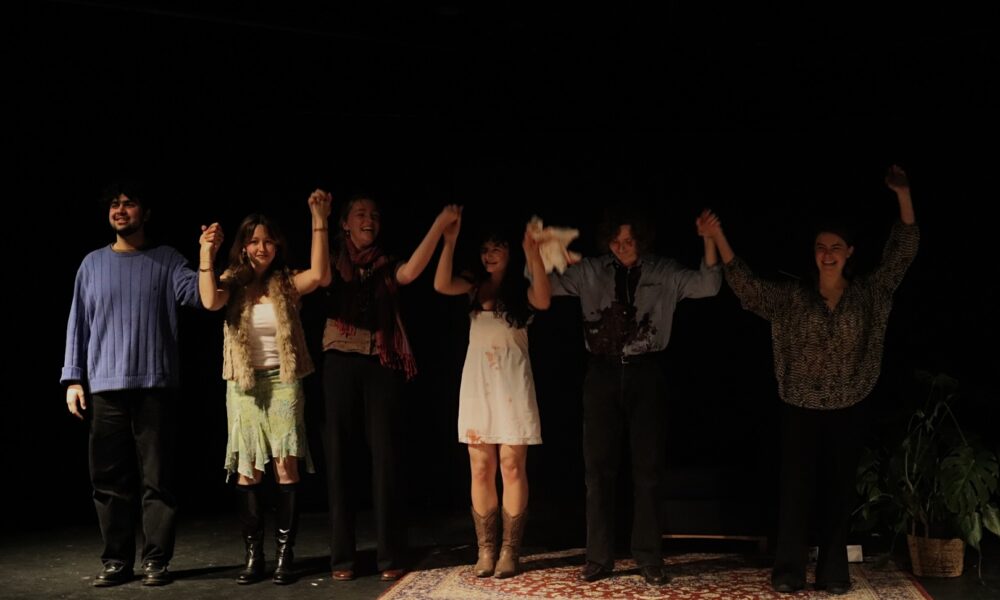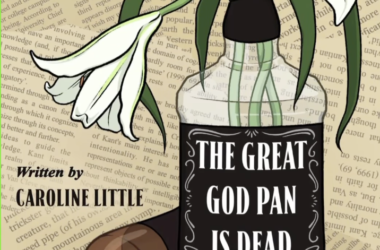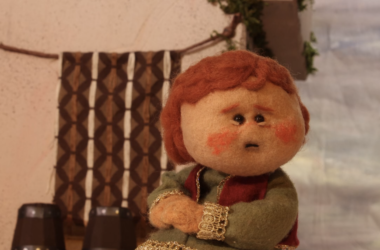The stage lights open on a young couple celebrating their new house. Yerma and John decide they want a child. They bicker as much as they laugh; the cracks in their relationship have already taken shape. Two years go by, and the cracks have become oceans drowning any possibility of a child until only Yerma’s fantasy remains. Yerma, a work originally by Federico García Lorca and adapted for English-speaking audiences in 2017 by Simon Stone, explores a woman’s deep craving for motherhood and the lengths she is willing to go to achieve it. Players’ Theatre’s most recent production, Yerma, directed by Ruby Isaacs, U2 Arts, delivers an evocative retelling of this captivating tale.
Odessa Rontigiannis, U2 Arts, delivers a compelling and nuanced performance in the titular role. She encapsulates Yerma’s internal struggle between hope and desperation, leading to a gripping presentation of her declining mental health. The cast as a whole brings out the intricacies in Yerma’s various relationships and shows an impressive handling of the complex subject matter beyond their years.
Ruby Isaacs’ version of Yerma is deeply personal—Players’ small playhouse was the perfect setting. The venue’s size fostered connection between performers and audience, engrossing them in the plot. The set design mirrored the intimacy of the subject matter, consisting only of an armchair, a lamp, and a plant overtop a cozy rug. This established a rapport with the audience and centred the focus on the mental and emotional aspects of the plot.
Isaacs cleverly used the plant to represent the blurring of Yerma’s own aspirations with the expectations placed on her. Struggling with infertility, Yerma internalizes the societal pressure placed on women to bear children. As a popular blog writer, her readers expect vulnerability; however, being watched increases the pressure she already feels to adhere to societal expectations. While her transparency around infertility brings awareness to an important issue, it propels her disappointment into the public eye, thereby amplifying the pressure she faces. It is during the confusion of her motivations that the plant shifts from representing a sphere of intimacy in the home to the liminal space of semi-privacy that is the garden. This new location represents the blend of public opinion and her own goals that get increasingly muddled throughout her life. The complete confusion of the two becomes clear at the end when Yerma exclaims that not having a child is accepting social irrelevancy.
Through the show’s soundtrack and costuming, Isaacs explores the theme of aging in a society that overvalues youth. At the start of the work, aging is represented as a celebration of career accomplishments and financial security. However, it quickly turns into a reminder of the diminishing possibility of motherhood as expressed by the choice to play the dreamy opening of Lorde’s “Ribs” between scenes. The song speaks of the fleeting nature of youth and a fear of dealing with the responsibilities of adulthood. Yerma’s mode of grappling with losing the social currency of youth is to have a child. When this is no longer a feasible option, she becomes reckless, losing herself to her spiraling thoughts.
When speaking to Isaacs after the show, she quoted a line from Florence and The Machine’s song “South London Forever” that she said inspired her production: “We’re just children wanting children of our own.” Yerma has a deep desire for motherhood that stems from maternal love and a yearning for social relevance. The play culminates in her return from a reckless night of desperate partying in a short white dress. The dress is on backwards—she can no longer correctly wear the costume of youth. Unable to find her role in society, she decides to take herself out of it completely. Yerma does not offer a solution to the issues it presents, but opens up a necessary dialogue around the overwhelming pressures facing adult women today.









